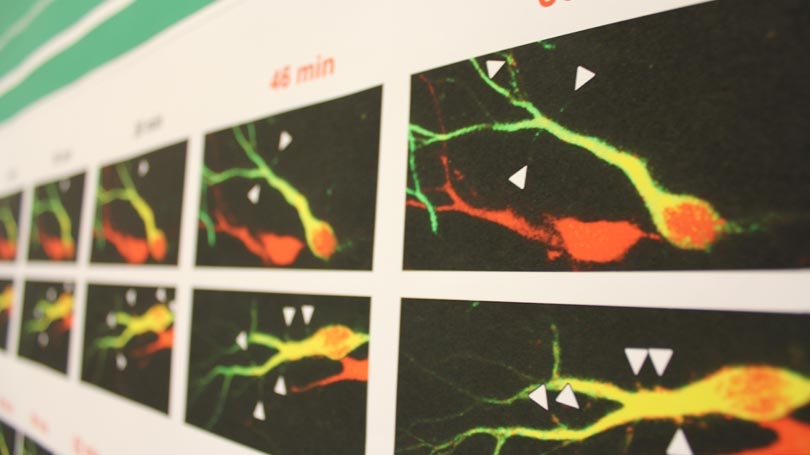
Detail from one of this year's posters presented at the 2017 Neuroscience Day event at Dartmouth
The 31st Annual Neuroscience Day at Dartmouth held on Saturday, April 8th, saw the attendance of over 100 faculty members, post-doctoral researchers, graduate and undergraduate students from Dartmouth, Keene State College, and the University of Vermont. Attendees congregated at the Class of 1978 Life Sciences Center to share their research and discuss current work in the field of neuroscience. Some of the topics of discussion were Motivation and Emotion, Neurodegenerative Disorders and Injury, Neurodevelopment, Integrative Physiology and Behavior, Cognition, Motor Systems, and Techniques.
The day featured expert talks, a poster session, a panel career discussion, and a keynote lecture. It began with ten “Teaser Talks” where students presented their research in five minute talks and inspire visits to their poster during the poster session that followed. The poster session allowed these students as well as others to present their research in a more detailed format. Some of the groundbreaking work presented by Dartmouth affiliates were featured in posters by Emily Stephens, a fifth year PEMM Ph.D. candidate in the lab of Dr. Allan Gulledge, Dr. Jibran Khokhar, a postdoc in the lab of Dr. Alan Green, and Drayton Harvey, a senior undergraduate student in the lab of Dr. Aihua Li. Stephens spoke about her thesis work regarding the effects of chronic selective serotonin reuptake inhibitor (SSRI) treatment on serotonin expression and function in the cortex of the rat. Khokhar discussed his research on impaired brain circuitry in the reward system that may play a causal role in the development of alcohol abuse in a rat model of schizophrenia and co-occurring alcohol use disorder. Harvey focused on his senior thesis work about the effect of low oxygen during pregnancy on the possibility of SIDs in the offspring.
Following the student showcase at the poster session, faculty from all three participating universities discussed their most recent findings with the attendees. To mention a few talks, Dr. Michael Hoppa spoke about his new discovery about the direction excitatory signals travel when they hit a fork in the axon, Dr. Luke Chang discussed the parts of the brain involved in forming first impressions and how those impressions change in different social contexts, and Dr. Bryan Luikart mentioned some of his new work on the morphological and functional changes observed in neurons that have a mutation commonly found in autism spectrum disorder.
The next session of the day was the career panel discussion. The panel was composed of highly regarded scientists and researchers including: Dr. Anne Bothmer, a scientist for Editas Medicine, Dr. Sameera Dasari, a clinical research associate for Abbott, Dr. Wilder Doucette, an assistant professor and practicing psychiatrist, Dr. Michael Hoppa, an assistant professor, Emily Stephens, a fifth-year graduate student, and Dr. Michael Williams, a postdoctoral research associate. Quickly the attendees challenged the panel with questions about economic stability, academic opportunities, and discontent in scientific research. With experts in industry and in academia, we learned that bureaucracy in industry can keep a scientist from exploring the interesting findings that come up with everyday experiments, but the promise of a 9-5 job was appealing. We also learned that frustrations of daily experimental failures and the stress of receiving funding are easily overwhelming, but the freedom of adventure into the interesting avenues that arise in research can provide excitement. Most importantly, however, the panel discussed how important it is to be happy in your everyday life. Dr. Williams said, “Focus on the things that make you happy every day you go into the lab. Find a career path that will allow you to do the most of that activity that you can; whether it be writing, bench work, data analysis et cetera. If you don’t have any happy moments, research may not be for you.” The panel also recommended attending a conference or collaborating with a neighboring lab when things get rough during your graduate degree research.
Neuroscience Day ended with a talk from the keynote speaker, Dr. Ann Graybiel, a principal investigator at MIT. Dr. Graybiel’s expertise is highlighted by her election to the National Academy of Sciences of the U.S.A. and the American Academy of Arts and Sciences, and her many awards including the Dow Award and the Vanderbilt Prize, and the National Medal of Science. She shared her work on the differences between brain signaling when deciding to do something and when it becomes a habit. Her studies focus on how regions of the forebrain interact during movement, mood, and motivation. Using state-of-the-art modulation systems, Dr. Graybiel has altered these connections to diminish non-beneficial or partially beneficial decisions. Her work has the potential to describe human disorders that involve value-based decision making that can become habitual, like addiction.
Thanks are in order to the Neuroscience Council for organizing the event and to the many departments at Dartmouth without which the event would not have been made possible: The Neuroscience Center at Dartmouth, New Hampshire-INBRE, Thayer School of Engineering and Associate Dean of Faculty for the Social Sciences, Jay Hull. Additional thanks go to administrators of the event, Carissa Francoeur and Ann Lavanway.